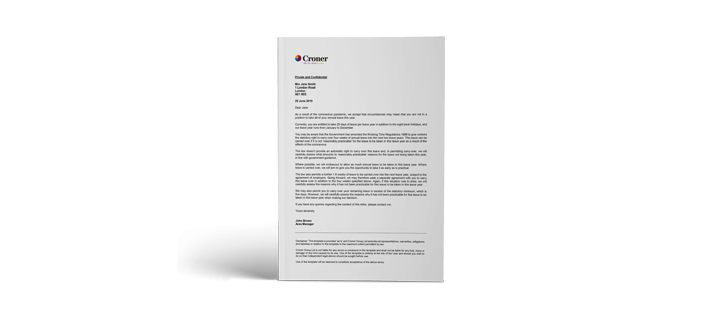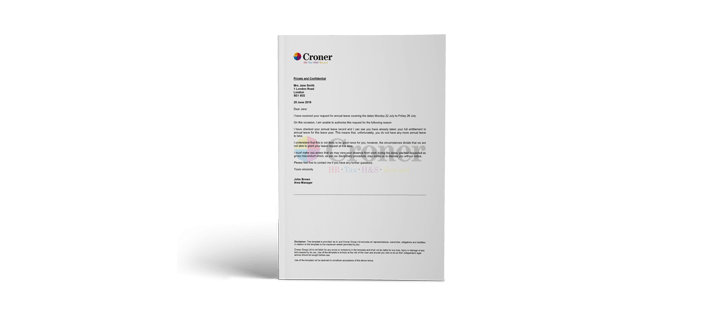To keep your business functioning at full capacity you need your employees at work. It’s that simple. And yet, organisations across the UK are constantly grappling with poor attendance, difficult leave requests, absenteeism, presenteeism, and dismal staff turnover.
But it doesn’t have to be that way. There are methods of taking control and reducing whatever type of leave is troubling your business.
What is absence management?
The average UK worker is absent for almost seven days annually. As you can imagine, this costs employers a significant amount in sick pay.
Absence management is a way of reducing the number of business days lost without negatively impacting employee morale.
Leave of absence laws
The Working Time Regulations specify the maximum an employee can work in a day before having time off work. It also specifies that every worker must have (at least) 5.6 weeks’ paid annual leave each year.
Finally, the law dictates that employees have the right to take additional leave from work for a number of different reasons.
Types of leave
Maternity leave
When an employee is pregnant, they have the right to time off to care for their baby. The earliest maternity leave can begin is 11 weeks prior to the expected week of childbirth.
However, if the baby arrives early, maternity leave starts the day after the birth or if your staff is off work sick due to pregnancy-related issues in the fourth week before the birth of the baby then their maternity leave begins automatically. Then, they are entitled to statutory maternity leave, which is 52 weeks. This is made up of:
- Ordinary maternity leave (first 26 weeks)
- Additional maternity leave (last 26 weeks)
Employees don’t have to take the full 52 weeks, but they must take a minimum of two weeks leave after their baby is born.
Paternity leave
Similar to maternity leave, this is when an employee takes time off because their partner is having a baby, adopting, or having a baby through surrogacy.
The employee can choose to take either 1 or 2 weeks leave, and they must take it in one go. A week counts as the normal amount of days the individual normally works in a week. So, if an employee works 3 days a week, and has 2 weeks paternity leave, they’d have 6 days off.
Leave can’t begin before the birth, and it must end within 56 days of the birth.
Shared parental leave (SPL)
New parents can share up to 50 weeks of leave. Both the leave and pay must be shared within the first year of the employees’ child being born. The 50 weeks can be taken in blocks or all in one go. Employees can also choose to stagger the leave and pay.
To be entitled to SPL, both employees must meet the eligibility criteria and provide you with sufficient notice. The notice period must be at least eight weeks before the first period of leave that the employee wishes to take.
The criteria is as follows:
- Both parents must share responsibility for the child at birth
- They must both have been continuously employed by for at least 26th weeks by the end of the 15th week before the due date
- They must remain under your employ for the period of SPL
- Be ‘employees’
Bereavement leave
There’s no legal requirement to provide an employee time off following the death of a loved one. Whether you offer it—paid or unpaid—is at your discretion. Most employers do tend to offer this, and you should outline when it can be taken and for how long in your employment documents.
Compassionate leave and bereavement leave are often used interchangeably. The two are very similar, however, bereavement typically refers to the death of a loved one, whereas compassionate can be taken to care for a dependant or a sick relative.
Other
Of course, that’s not all. There’s also:
- Time off to deal with duties as a trade union official
- Time off for dependants
- Time off for parental leave
- Time off for antenatal care
- Time off to deal with duties as a European Works Council member
- Study leave for 16/17 years olds for certain qualifications
- Time off during notice of redundancy when seeking new work
- Time off for health & safety representative duties
- Time off for pension fund trustee duties
- Time off for jury service
- Time off for employee representative duties
- Time off to accompany a colleague to a disciplinary or grievance
- Suspension
If you have questions about any of these types of leave, or an employee is off work for none of the reasons above, speak to a Croner adviser today on 0808 145 3380.
How to manage absence
It doesn’t matter what type of leave or absence you are trying to manage. The techniques tend to be the same. So, whether you’re struggling with sickness absence, staff turnover, unauthorised absences or absenteeism, here are a few methods you can employ:
- Return to work interviews: This is considered one of the most effective ways of reducing absence. After any time off, but particularly after sickness absence, have a catch up with the employee. This helps establish any alternative arrangements that might need to be made to accommodate the employee. It also highlights that you are monitoring employee absence closely, meaning the number of unauthorised absences drops.
- Measure lost time: This helps you understand the full extent of absences, and what the root causes are. With this knowledge, you are able to implement new systems to address the problem. Using methods such as the Bradford Factor, you’re able to identify persistent short-term absence. This allows you to sit down with the individuals and discuss what their particular issue is.
- Create an absence management policy: Having a clear policy will reinforce that you take absence seriously while demonstrating employees’ rights and responsibilities. You’re legally obliged to inform the employee about sick leave and pay, but why not take the opportunity to go into detail on the other types of leave and absence?
- Employee assistance programmes: If employees are struggling, or they have problems at home, an EAP is a great way of ensuring they get the help they need quickly and effectively. You can find details on our employee assistance programme here.
Finally, when all other options are exhausted, you can go down the disciplinary route. This should always be a last resort after trying everything else. Ensure that any dismissals as a result of absence are non-discriminatory and follow a fair procedure. That way, you can minimise the risk of an unfair dismissal claim.
Questions about absence?
There are so many different types of leave to contend with it can be hard to keep track. And, the bigger your business gets, the more leave and absence you’ll have to manage.
Get support before it gets too much. Call Croner today on 0808 145 3380.
































































